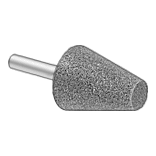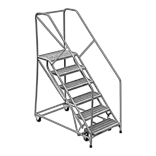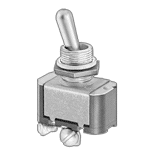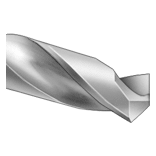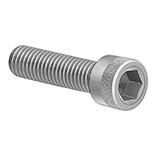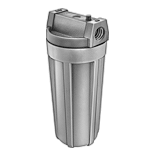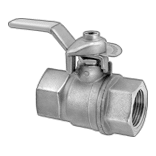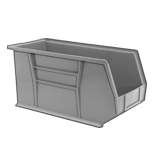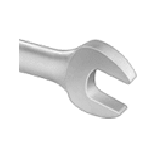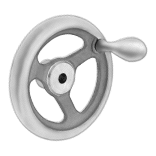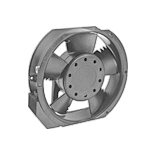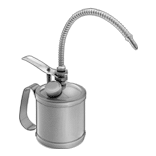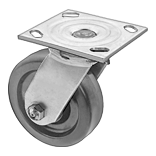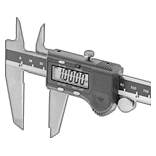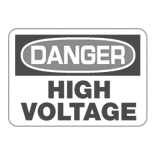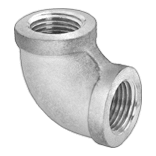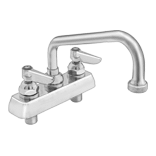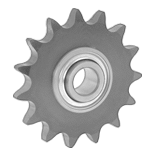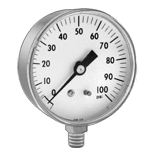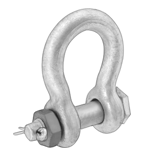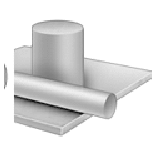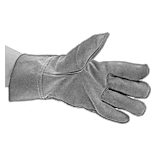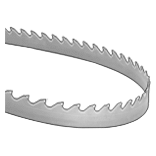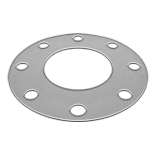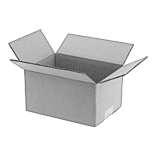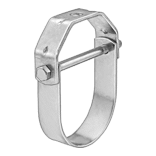Matching Flow Diagrams to Replace an Air Directional Control Valve
More
Choosing an Air Directional Control Valve
More
Key-Operated Two-Speed Two-Action Air Directional Control Valves
Because they require a key to operate, you can limit who is able to adjust these valves. Often used to extend and then retract a cylinder at different speeds, they create two actions and have two exhaust ports, which allows you to control the speed of each action by attaching a flow control valve to each exhaust port. They direct airflow from the inlet to your equipment and exhaust return airflow to create motion. Return actuation is by hand, so they stay actuated and return to their original position only when you move the actuator again. Also known as 4-way and 5/2 valves.
Flow coefficient (Cv) is a measurement that indicates how much airflow can pass through a valve.
For technical drawings and 3-D models, click on a part number.
Overall | |||||||||||||||
|---|---|---|---|---|---|---|---|---|---|---|---|---|---|---|---|
| No. of Flow Ports | Inlet Size | Outlet Size | Exhaust Connection Type | Max. Flow Rate, scfm @ 100 psi | Flow Coefficient (Cv) | Pressure Range, psi | Vacuum Rating, in. of Hg | Lg. | Wd. | Ht. | For Panel Cutout Dia. | Mounting Fasteners Included | No. of Keys Included | Each | |
Threaded Female Inlet × Threaded Female Outlet | |||||||||||||||
| 5 | 1/8 NPT | 1/8 NPT | Threaded | 11.3 | 0.34 | 14-145 | 26.5 | 7/8" | 1 5/8" | 5 5/8" | 1 1/4" | No | 2 | 0000000 | 0000000 |
Key-Operated Single-Action Air Directional Control Valves
Because they require a key to operate, you can limit who is able to adjust these valves. Also known as 3-way and 3/2 valves, they create one action, such as extending a cylinder. Valves direct airflow from the inlet to your equipment and exhaust return airflow to create motion. They're normally closed to block airflow until actuated. Return actuation is by hand, so they stay actuated and return to their starting position only when you move the actuator again. In the off position, they exhaust air pressure from the system to the atmosphere, allowing equipment to reset so the action can be repeated.
Flow coefficient (Cv) is a measurement that indicates how much airflow can pass through a valve.
For technical drawings and 3-D models, click on a part number.
Overall | ||||||||||||||
|---|---|---|---|---|---|---|---|---|---|---|---|---|---|---|
| No. of Flow Ports | Inlet Size | Outlet Size | Max. Flow Rate, scfm @ 100 psi | Flow Coefficient (Cv) | Pressure Range, psi | Vacuum Rating, in. of Hg | Lg. | Wd. | Ht. | For Panel Cutout Dia. | Mounting Fasteners Included | No. of Keys Included | Each | |
Threaded Female Inlet × Threaded Female Outlet | ||||||||||||||
| 3 | 1/4 NPT | 1/4 NPT | 33.53 | 1.05 | 0-145 | 29.5 | 1 5/8" | 1 5/8" | 4 1/8" | 1 1/8" | No | 2 | 000000 | 000000 |
Key-Operated Air-Release Valves for Water
- Max. Pressure: 150 psi
- Temperature Range: 33° to 200° F
Turn the key to manually release air from radiators, heaters, and other hot water equipment. These valves have a vented relief port that exhausts discharge directly. Body is nickel-plated brass for good corrosion resistance.
